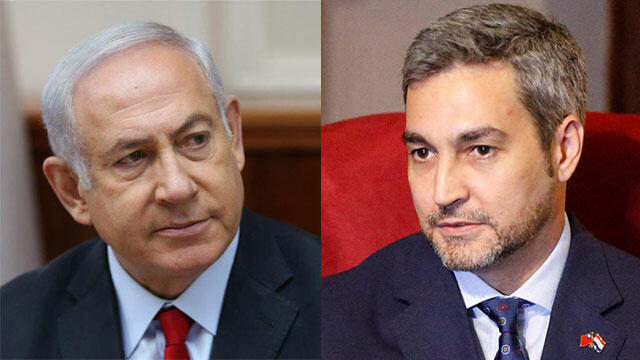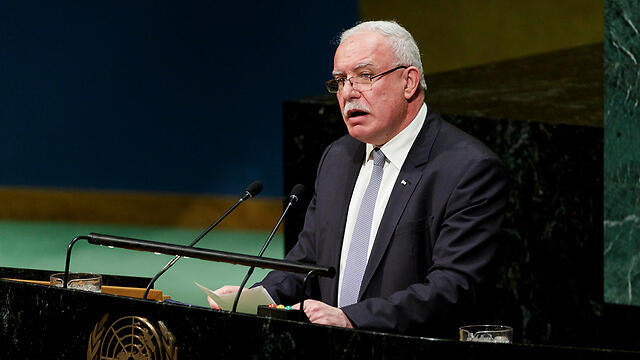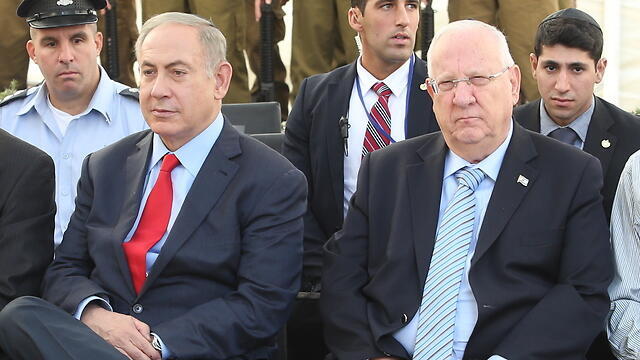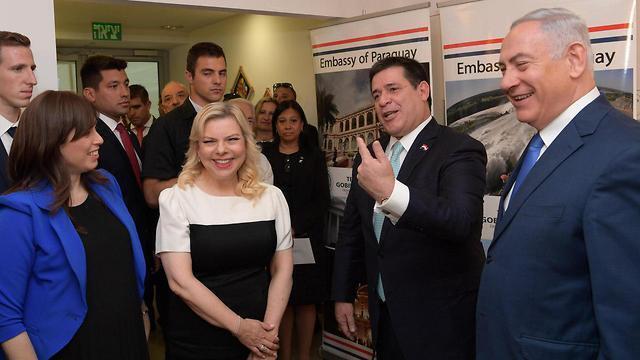Getting your Trinity Audio player ready...
The Palestinians have revealed their persuasion efforts leading to the Paraguayan leadership's decision to move its embassy from Jerusalem back to Tel Aviv.
and Twitter
Israel believes that the decision was made due to Arab pressure and a promise of future investment deals in the country.
The decision was made two weeks when the Palestinian Foreign Minister, Riyad al-Maliki, arrived in Paraguay for an official visit aimed at convincing the Asunción leadership to move their embassy back to Tel Aviv, while taking advantage of the country's change of government.
Al-Maliki said that he had already received an official promise from new President of Paraguay, Mario Abdo Benítez, and the new foreign Minister, Luis Alberto Castiglioni that the move would take place quietly in early September.
The Palestinian foreign minister returned with the happy news to Ramallah and briefed Palestinian President, Mahmoud Abbas on the Paraguayan promise, stressing that the matter must be kept secret until Paraguay publicly announces the decision to movie its embassy back to Tel Aviv.
After the official announcement, Al-Maliki issued a statement in which he acknowledged Paraguay's move and commitment to international law and UN Security Council resolutions. He stressed that the return of the embassy to Tel Aviv is in Paraguay's interest, which will allow the country to maintain stable ties with Arab countries.
Following the announcement, the Palestinian Foreign Ministry hailed Paraguay's decision as "a new Palestinian diplomatic achievement."
"Minister al-Maliki exerted a big effort during his meeting with the new president who instructed his foreign minister to arrange the issue," the Palestinian foreign ministry added.
Paraguay's decision caused a stir in Israel. Hours after the Latin American nation made the announcement, Prime Minister and Minister of Foreign Affairs Benjamin Netanyahu ordered the closure of Israel's embassy in Paraguay and the return of the Israeli ambassador.
"Israel views with great severity the unusual decision by Paraguay that will strain the ties between the countries," Netanyahu posted on Twitter.
Explaining the new Paraguayan move, the country's foreign minister, Luis Alberto Castiglioni, said: "Paraguay wants to contribute to an intensification of regional diplomatic efforts to achieve a broad, fair and lasting peace in the Middle East."
Referring to Israel's response, Castiglioni said that the reaction was "disproportionate."
Paraguay president Abdo, who took office last month, defended his decision as part of an effort to support "broad, lasting and just peace" among Israelis and Palestinians."Paraguay is a country of principles," Abdo added on Twitter.
Israeli officials estimate that pressure from Arab countries, and possibly a promise of future investment in the country, are the reasons behind Paraguay's decision.
Netanyahu tries to trick Rivlin
On August 10, Yedioth Ahronoth's journalist, Nahum Barnea revealed the true story behind the scenes.
At the end of July, President Reuven Rivlin visited Croatia. During the visit Rivlin received a message from the Foreign Ministry in Jerusalem saying that Netanyahu has asked him to attend the inauguration ceremony of the new president of Paraguay, Abdo.
When Rivlin asked why Netanyahu is not traveling himself, he was told that the prime minister is scheduled to attend the inauguration ceremony of the new Presidents of Colombia at the same time.
When asked what made Paraguay so important, the Foreign Ministry said that the outgoing Paraguayan President, Horacio Cartes, moved the embassy to Jerusalem but added a condition: within six months they will decide whether to leave it there or move the embassy back to Tel Aviv.
The Foreign Ministry stressed the importance of keeping the Paraguayan embassy in Jerusalem, and told Rivlin that a visit by a president will help convince Abdo, the new president of Paraguay, to do so.
Rivlin understood that Netanyahu was setting a trap for him: if he visits Paraguay, and the new president moves the embassy, he would be the culprit.
It should be noted that Paraguay is a complicated issue in the Prime Minister's Office.
Ari Harow ,former Chief of Staff of the Prime Minister's Office, and now a state witness, allegedly received money to promote relations with Paraguay.
More than three years ago, Netanyahu ordered the Foreign Ministry to open an embassy in Asunción, the capital of Paraguay, contrary to the position of the ministry.
After Rivlin rejected the Foreign Ministry's request, Netanyahu sent Jerusalem Mayor Nir Barkat to Paraguay, where he met with the outgoing and incoming Paraguayan presidents.
Netanyahu: The move 'symbolizes the friendship between the countries'
After former Paraguayan president Cartes inaugurated the new embassy in Jerusalem, Netanyahu thanked him and said: "This is a great day for Israel. A great day for Paraguay. A great day for our friendship. You have not only the support of our government but the profound gratitude of the people Israel."
"Paraguay helped the Jews escape Nazi Germany," the prime minister said of the historic bond between Paraguay and the Jewish people.
Paraguay's former president inaugurates Jerusalem embassy
(צילום: איוון אלכסייביץ')
"We will never forget it. You did it before, during and after the Holocaust. It was an expression of compassion and generosity that will always be etched in our hearts. Paraguay also supported the establishment of the State of Israel and recognized Israel at the UN. We won't forget that, either," Netanyahu added.
"It is an honor for me to be here today," Paraguayan President Cartes said at the ceremony.
"I don't like binding or ambiguous positions. Our friendship is based on shared values, such as democracy, tolerance and dignity, lack of discrimination and peaceful coexistence," Cartes stated.
The embassy in Jerusalem was inaugurated just a few months ago, in May. The decision to move the embassy to Jerusalem was made by former President Horacio Cartes after he was elected and before his term ended.
Cartes announced the decision at an event celebrating Israel's 70th Independence Day in Asunción. A month later he arrived in Jerusalem in and opened the embassy in to inaugurate the new embassy at the Malha Technology Park, near the new Guatemalan embassy in Jerusalem.
At the time, reports surfaced in Paraguay that President-elect Abdo was not comfortable with the decision to move the embassy to Jerusalem, and said that after he takes office he would move the embassy back to Tel Aviv. Paraguay denied these reports at the time, which now seem accurate.
The decision to shut down the Israeli Embassy in Paraguay is not surprising, since the decision to open the embassy was made contrary to the professional position of the Foreign Ministry.
Paraguay is not considered an important country and the person who pushed for the opening of the embassy was a close associate of Netanyahu Yechiel Leiter, who was the chief strategist in Cartes' campaign his strategic adviser for several years.
Paraguay's decision was a blow to Israel's efforts to achieve external recognition of Jerusalem as its capital, which appeared to have gained some traction this year with the United States, Guatemala and Paraguay opening embassies there.
Jerusalem may be comforted by Bulgaria's decision to open an honorary consulate in the city.
First published: 12:08, 09.06.18









